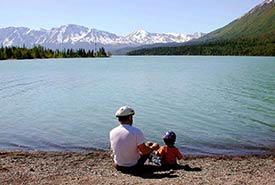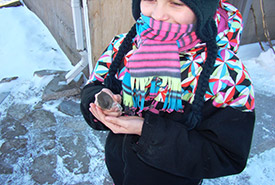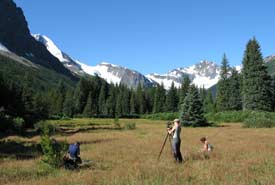Do you get enough Vitamin N?

Father and child by the lake (Photo by Laubenstein Karen, U.S. Fish and Wildlife Service/Wikimedia Commons)
You find yourself breathing more deeply, taking in the sharp scent of pine and the sweet mustiness of leaves returning to dust on the forest floor beneath your feet. For a moment, the quiet is broken only by birdsong — the notes that signalled the absence of predators nearby to generations of your ancestors — and your pulse rate slows. Some neglected part of you is home, and you realize you’ve left your worries somewhere between your front door and this moment.
According to Richard Louv, the author of the recently published Vitamin N: The Essential Guide to a Nature-Rich Life, this vital experience is one that too many of us are missing, and it is taking a toll on health and well-being, especially that of our children. He first issued a clarion call with his internationally bestselling book Last Child in the Woods: Saving Our Children from Nature-Deficit Disorder, and he followed that up with The Nature Principle: Human Restoration and the End of Nature-Deficit Disorder.
Research he shares in his books provides evidence that spending time in forests has benefits that range from increasing mental acuity to alleviating obesity, attention issues, anxiety and depression. He writes, “Time spent in nature may also improve social bonding and reduce social violence, stimulate learning and creativity, strengthen the conservation ethic and even help raise standardized test scores…. As one scientist puts it, we can now assume that just as children need good nutrition and adequate sleep, they may very well need contact with nature.”

Bird release, Christmas Bird Count 4 Kids, Haldimand County, Ontario (Photo by NCC)
From calming a fussy infant (and stressed parent) by getting outdoors and finding a tree to touch to developing sensory “superpowers” by reconnecting with the myriad sounds, smells, sights and tastes of the forest, Richard says that time in nature is an essential counterbalance to our fast-moving, gadget-laden modern life. In fact, he argues, “the future will belong to the nature-smart — those individuals, families, businesses and political leaders who develop a deeper understanding of the transformative power of the natural world and who balance the virtual with the real.”
With “stranger danger,” our collective addiction to screen time and a widespread lack of awareness of the importance of getting outside, he advocates for proactive parenting and education strategies as well as public policy that ensure regular access to nature for children. (In Last Child in the Woods, he quotes a Grade 5 student from San Diego who said, “I like to play indoors better, ’cause that’s where all the electrical outlets are.”)
Providing video remarks for the Nature Conservancy of Canada’s (NCC’s) Why Forests Matter cross-country series, Richard also prescribes an antidote. In the introduction to Vitamin N, he describes a prescription presented by Janet Ady of the U.S. Fish and Wildlife Service:
Directions: Use daily, outdoors in nature. Go on a nature walk, watch birds and observe trees. Practice respectful outdoors behaviour in solitude or take with friends and family.
Refill: Unlimited
Expires: Never
Here, he says, is “a deceptively simple treatment for improving physical and mental health, for stimulating learning, creativity and sense of being fully alive; definitely not a panacea, but an appropriate elixir in the age of nature-deficit disorder.”
This post originally appeared in the Globe and Mail and was produced with the support of Randall Anthony Communications Inc.


